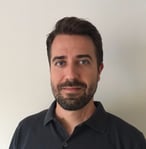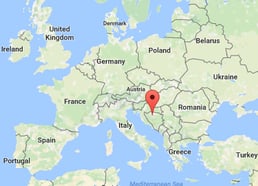

This month we have the pleasure of interviewing Predrag Kovacevic, from the Republic of Srpska, an autonomous entity within the country of Bosnia and Herzegovina. Predrag Kovacevic is President of the Actuarial Association of the Republic of Srpska and appointed actuary for several insurance companies. He works as head of the finance department of Sberbank Banja Luka. He has more than 10 years of experience in the insurance and banking industries in the Republic of Srpska and Bosnia and Herzegovina. He holds a Master’s degree in actuarial mathematics from the University of Banja Luka in Bosnia and Herzegovina.
ACTEX Learning (AL): How many practicing actuaries do you have?
Predrag Kovacevic (PK): Currently we have 36 actuaries with a valid license issued by the Insurance agency of the Republic of Srpska.
AL: What is the word for actuary in your local language?
PK: We say aktuar. It is the German word for actuary.
AL: When was actuarial science first introduced?
PK: Although there are some papers and books from the period between the two world wars, actuarial science, in its true sense, was introduced in 2006.
AL: What is your favorite part about being an actuary?
PK: My favorite part about being an actuary is that we use techniques which others mostly don’t understand, so nobody really argues with us about our results and findings.

AL: Can you share an interesting anecdote or two from your career?
PK: There was a situation when an actuary talked with the senior management of an insurance company about an investment in one company in a difficult situation which was extremely overvalued. He said that that investment couldn’t be used to cover technical provisions and they should find other eligible assets. The management didn’t want to accept this and started to argue and explain that the company is fine and that it was worth that amount of money. Then the actuary made the suggestion that they should sell it at the current book value and invest the money in some higher quality assets. After he made this proposal, they said “But who would possible wanted to buy such a bad company and especially for such a high price?”
AL: Do you have any advice for young people in your country interested in pursuing this career?
PK: My advice would be -- continue to work on your self-development through specialized actuarial courses, seminars or by passing exams.
AL: What are some of the highlights of the history of the actuarial profession in your country?
PK: Our history of the actuarial profession is very short, so the highlight would be that we are recognized as a profession.
AL: What are some of the main challenges and projects for your association over the next 5-10 years?
PK: We would like to be able to become an association able to teach students and others who are interested in becoming an actuary.
AL: What developments on the horizon could affect future opportunities in your country?
PK: Premium levels for motor insurance, the insurance with the highest market share, are currently regulated by law. This practice should be abandoned within the next five years which will then provide a huge opportunity for actuaries to prove their worth.
AL: What have you seen from inside your company? Where do you think the changes to actuarial work in your country will happen in the next five years?
PK: As I mentioned in the previous question, free risk and a market-driven premium level on motor insurance will create a whole new dimension for the actuarial profession.
AL: Who are the main employers of actuaries?
PK: Currently, only insurance companies are employing actuaries. Actuaries in insurance companies are employed as internal and appointed actuaries. Internal actuaries are employed by an insurance company and do all the actuarial jobs for the company while the appointed actuary is engaged but not employed by that insurance company and their task is to check the calculations of the internal actuary and to give an independent opinion on these calculations. External actuaries mostly work in the banking industry or as university professors.
AL: What qualifications do you find most important for upcoming actuaries?
PK: Upcoming actuaries should be more concentrated on risk management than on financial reporting.
AL: Do the schools in your country have actuarial majors, minors, concentrations or do students study on their own or overseas?
PK: Many local and regional universities have master’s programs in actuarial sciences; however, the quality of the programs are of questionable practical value.
AL: What is the credentialing procedure like for an actuary in your country?
PK: The insurance agency is the only body authorized to issue licenses for actuaries. The requirement for an actuarial license is to pass all the exams in one of the approved university master’s programs.
AL: Do employers support the cost and time of exam preparation?
PK: Yes, but usually only the cost and not the time.
AL: What is your favorite Excel function and why?
PK: We mostly use VLOOKUP and SUMIF because we always have to connect data from various sources. The current state of databases in insurance companies is not at a high level, so most of our time is spent on data quality issues.
AL: Do you have any non-actuarial hobbies?
PK: Currently, I enjoy spending free time with my two sons. I also like traveling and experiencing new cultures.
AL: What could people from outside of your country do to help the profession grow?
PK: What we really have a shortage of and what we really need is practical experience. Actuaries from countries with a developed actuarial profession could help us with knowledge transfer.
AL: Is there anything else you would like to add?
PK: If you would give us the opportunity, we would like to thank your company for giving us support, the actuaries from Actuaries Without Borders (AWB), a section of the IAA, who already visited us and shared their experience with us (Ms. Renata de Leers, Prof. Nasser Hadidi, Mr. Daniel Benjamin, and Mr. Steven Glicksman), and the former SOA representative for Europe and the Middle East, Mr. Carlos Arocha.

